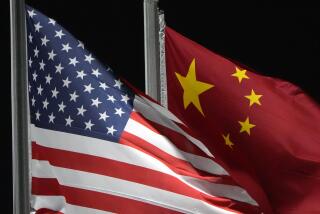Top U.S. tech companies begin to cut off vital Huawei supplies

Huawei Technologies Co. is China’s largest telecommunications company.
Top U.S. corporations including chipmakers and Google have frozen the supply of crucial software and components to Huawei Technologies Co., complying with a Trump administration crackdown that threatens to choke off China’s largest technology company.
Chipmakers including Intel Corp., Qualcomm Inc., Xilinx Inc. and Broadcom Inc. have told their employees they will not supply Huawei until further notice, according to people familiar with their actions. And Alphabet Inc.’s Google cut off the supply of hardware and some software services to the Chinese giant, another person familiar with the decision said, asking not to be identified discussing private matters.
The moves, which had been expected, hamstring the world’s largest provider of networking gear and No. 2 smartphone vendor. The Trump administration on Friday blacklisted Huawei — which it accuses of aiding Beijing in espionage — and threatened to cut it off from the U.S. software and semiconductors it needs to make its products. Blocking the sale to Huawei of crucial components could also disrupt the businesses of American chip giants such as Micron Technology Inc. and slow the rollout of vital 5G wireless networks worldwide — including in China. That in turn could hurt U.S. companies that are increasingly reliant on the world’s second largest economy for growth.
If fully implemented, the Trump administration action could have ripple effects across the global semiconductor industry. Intel is the main supplier of server chips to the Chinese company, Qualcomm provides processors and modems for many of Huawei’s smartphones, Xilinx sells programmable chips used in networking, and Broadcom is a supplier of switching chips, another key component in some types of networking machinery. Representatives for the chipmakers declined to comment.
Huawei “is heavily dependent on U.S. semiconductor products and would be seriously crippled without supply of key U.S. components,” said Ryan Koontz, an analyst at Rosenblatt Securities Inc. The U.S. ban “may cause China to delay its 5G network build until the ban is lifted, having an impact on many global component suppliers.”
Who is the man behind Huawei and why is the U.S. intelligence community so afraid of his company? »
To be sure, Huawei is said to have stockpiled enough chips and other vital components to keep its business running for at least three months. It’s been preparing for such an eventuality since at least the middle of 2018, hoarding components while designing its own chips, people familiar with the matter said. But its executives believe their company has become a bargaining chip in ongoing U.S.-Chinese trade negotiations, and that they will be able to resume buying from American suppliers if a trade deal is reached, they said.
The U.S. companies’ moves are likely to escalate tensions between Washington and Beijing, elevating fears that President Trump’s goal is to contain China, triggering a protracted cold war between the world’s biggest economies. In addition to a trade fight that has rattled global markets for months, the U.S. has pressured both allies and foes to avoid using Huawei for 5G networks that will form the backbone of the modern economy.
“The extreme scenario of Huawei’s telecom network unit failing would set China back many years and might even be viewed as an act of war by China,” Koontz wrote. “Such a failure would have massive global telecom market implications.”
The U.S. clampdown also deals a direct blow to Huawei’s fast-growing mobile devices division. Huawei will be able to access only the public version of Google’s Android mobile operating system, the world’s most popular smartphone software. It won’t be able to offer proprietary apps and services from Maps and search to Gmail, said the person, who requested anonymity speaking about a private matter. That will severely curtail the sale of Huawei smartphones abroad.
Huawei, the world’s largest smartphone brand after Samsung Electronics Co., was one of a select few global hardware partners to receive early access to the latest Android software and features from Google. Outside of China, those ties are crucial for the search giant to spread its consumer apps and bolster its mobile ads business.
The Chinese company will still have access to app and security updates that come with the open-source version of Android. Reuters reported the moves earlier. “We are complying with the order and reviewing the implications,” a Google representative said without elaborating.
More to Read
Inside the business of entertainment
The Wide Shot brings you news, analysis and insights on everything from streaming wars to production — and what it all means for the future.
You may occasionally receive promotional content from the Los Angeles Times.










